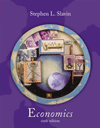 |
1 |  | 
Statement I. The basis for international trade is specialization. Statement II. Adam Smith said that we should import goods from a country that could make them more cheaply than we could. |
|  | A) | Statement I is true and statement II is false. |
|  | B) | Statement II is true and statement I is false. |
|  | C) | Both statements are true. |
|  | D) | Both statements are false. |
 |
 |
2 |  | 
The last year we ran a trade surplus was |
|  | A) | 1960. |
|  | B) | 1965. |
|  | C) | 1970. |
|  | D) | 1975. |
|  | E) | 1980. |
 |
 |
3 |  | 
Our trade surplus rose |
|  | A) | during World War I, but not World War II. |
|  | B) | during World War II, but not World War I. |
|  | C) | during both World War I and World War II. |
|  | D) | during neither World War I nor World War II. |
 |
 |
4 |  | 
We are running trade surpluses in ______ and trade deficits in _______. |
|  | A) | services, goods |
|  | B) | goods, services |
 |
 |
5 |  | 
Our tariffs have been relatively low since |
|  | A) | the 1820s. |
|  | B) | the 1860s. |
|  | C) | the 1920s. |
|  | D) | the 1940s. |
 |
 |
6 |  | 
Statement I. The ability of a country to produce a good or service at a lower cost than its trading partners is called comparative advantage. Statement II. There are no arguments made against free trade except that it throws millions of Americans out of work. |
|  | A) | Statement I is true and statement II is false. |
|  | B) | Statement II is true and statement I is false. |
|  | C) | Both statements are true. |
|  | D) | Both statements are false. |
 |
 |
7 |  | 
In general, economists |
|  | A) | approve of both tariffs and quotas. |
|  | B) | disapprove of both tariffs and quotas, but consider quotas the lesser of two evils. |
|  | C) | disapprove of both tariffs and quotas, but consider tariffs the lesser of two evils. |
 |
 |
8 |  | 
A tariff |
|  | A) | lowers supply. |
|  | B) | raises supply. |
|  | C) | has no effect on supply. |
 |
 |
9 |  | 
We are running large trade deficits with |
|  | A) | China, but not Japan. |
|  | B) | Japan, but not China. |
|  | C) | both Japan and China. |
|  | D) | neither Japan nor China. |
 |
 |
10 |  | 
Frederic Bastiat's "Petition of the Candlemakers to Shut out the Sun," |
|  | A) | took the side of the candlemakers that foreign competition was unfair. |
|  | B) | was basically an argument for free trade. |
|  | C) | made the case for government protection for that industry. |
|  | D) | had no economic significance. |
 |
 |
11 |  | 
Statement I. One important reason for our trade deficit is our huge oil import bill. Statement II. Our elementary and secondary educational systems are the best in the world. |
|  | A) | Statement I is true and statement II is false. |
|  | B) | Statement II is true and statement I is false. |
|  | C) | Both statements are true. |
|  | D) | Both statements are false. |
 |
 |
12 |  | 
Which would be the most accurate statement? |
|  | A) | Japanese markets have been largely closed to many imports. |
|  | B) | The Japanese consumer always buys the lowest-priced possible good, whether it is made in Japan or abroad. |
|  | C) | Because of Japanese trade practices, we have banned many Japanese goods from the United States. |
|  | D) | Japanese manufacturers compete almost entirely on the basis of price, rather than on the basis of product quality. |
 |
 |
13 |  | 
Statement I. Our main exports to Japan are agricultural. Statement II. Our TV manufacturers were driven out of business by the Japanese. |
|  | A) | Statement I is true and statement II is false. |
|  | B) | Statement II is true and statement I is false. |
|  | C) | Both statements are true. |
|  | D) | Both statements are false. |
 |
 |
14 |  | 
Which is the most accurate statement? |
|  | A) | Our trade deficit was gotten extremely large over the last few years. |
|  | B) | We can easily keep running even larger trade deficits well into the future. |
|  | C) | Our trade deficits today are no higher than they were 10 years ago. |
|  | D) | If the price of oil drops to about $15 a barrel, our trade deficit will virtually disappear. |
 |



 2002 McGraw-Hill Higher Education
2002 McGraw-Hill Higher Education